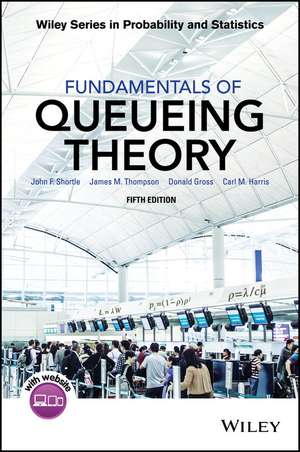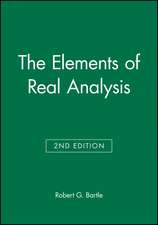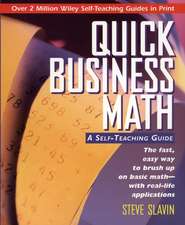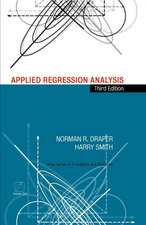Fundamentals of Queueing Theory, Fifth Edition: Wiley Series in Probability and Statistics
Autor JF Shortleen Limba Engleză Hardback – 24 mai 2018
Din seria Wiley Series in Probability and Statistics
- 20%
 Preț: 446.47 lei
Preț: 446.47 lei - 14%
 Preț: 882.53 lei
Preț: 882.53 lei - 14%
 Preț: 734.43 lei
Preț: 734.43 lei - 5%
 Preț: 1096.56 lei
Preț: 1096.56 lei - 23%
 Preț: 767.52 lei
Preț: 767.52 lei - 20%
 Preț: 512.10 lei
Preț: 512.10 lei - 24%
 Preț: 742.26 lei
Preț: 742.26 lei - 24%
 Preț: 561.57 lei
Preț: 561.57 lei - 9%
 Preț: 810.98 lei
Preț: 810.98 lei - 24%
 Preț: 678.66 lei
Preț: 678.66 lei - 24%
 Preț: 571.26 lei
Preț: 571.26 lei - 24%
 Preț: 885.94 lei
Preț: 885.94 lei - 22%
 Preț: 989.25 lei
Preț: 989.25 lei - 24%
 Preț: 816.66 lei
Preț: 816.66 lei - 8%
 Preț: 571.59 lei
Preț: 571.59 lei - 14%
 Preț: 794.49 lei
Preț: 794.49 lei -
 Preț: 313.49 lei
Preț: 313.49 lei - 24%
 Preț: 701.55 lei
Preț: 701.55 lei - 24%
 Preț: 908.75 lei
Preț: 908.75 lei - 24%
 Preț: 779.16 lei
Preț: 779.16 lei - 24%
 Preț: 739.43 lei
Preț: 739.43 lei - 24%
 Preț: 840.12 lei
Preț: 840.12 lei - 24%
 Preț: 709.66 lei
Preț: 709.66 lei - 20%
 Preț: 432.39 lei
Preț: 432.39 lei - 20%
 Preț: 442.06 lei
Preț: 442.06 lei - 24%
 Preț: 1001.21 lei
Preț: 1001.21 lei - 20%
 Preț: 481.53 lei
Preț: 481.53 lei - 24%
 Preț: 831.33 lei
Preț: 831.33 lei - 24%
 Preț: 817.10 lei
Preț: 817.10 lei - 9%
 Preț: 1156.10 lei
Preț: 1156.10 lei - 9%
 Preț: 1018.55 lei
Preț: 1018.55 lei - 9%
 Preț: 1084.76 lei
Preț: 1084.76 lei - 9%
 Preț: 959.15 lei
Preț: 959.15 lei - 9%
 Preț: 1049.41 lei
Preț: 1049.41 lei - 9%
 Preț: 1005.45 lei
Preț: 1005.45 lei - 9%
 Preț: 2242.09 lei
Preț: 2242.09 lei - 9%
 Preț: 2900.07 lei
Preț: 2900.07 lei - 9%
 Preț: 1052.38 lei
Preț: 1052.38 lei - 9%
 Preț: 1057.14 lei
Preț: 1057.14 lei - 9%
 Preț: 1703.85 lei
Preț: 1703.85 lei - 9%
 Preț: 1715.64 lei
Preț: 1715.64 lei - 27%
 Preț: 1197.22 lei
Preț: 1197.22 lei - 9%
 Preț: 967.34 lei
Preț: 967.34 lei - 9%
 Preț: 956.95 lei
Preț: 956.95 lei - 9%
 Preț: 961.92 lei
Preț: 961.92 lei - 9%
 Preț: 1148.91 lei
Preț: 1148.91 lei - 9%
 Preț: 1278.54 lei
Preț: 1278.54 lei - 5%
 Preț: 1257.50 lei
Preț: 1257.50 lei - 9%
 Preț: 1271.30 lei
Preț: 1271.30 lei - 9%
 Preț: 950.46 lei
Preț: 950.46 lei
Preț: 785.05 lei
Preț vechi: 1075.42 lei
-27% Nou
Puncte Express: 1178
Preț estimativ în valută:
150.26€ • 156.28$ • 125.92£
150.26€ • 156.28$ • 125.92£
Carte tipărită la comandă
Livrare economică 13-27 martie
Preluare comenzi: 021 569.72.76
Specificații
ISBN-13: 9781118943526
ISBN-10: 111894352X
Pagini: 576
Dimensiuni: 152 x 229 x 31 mm
Greutate: 1.41 kg
Ediția:5th Edition
Editura: Wiley
Seria Wiley Series in Probability and Statistics
Locul publicării:Hoboken, United States
ISBN-10: 111894352X
Pagini: 576
Dimensiuni: 152 x 229 x 31 mm
Greutate: 1.41 kg
Ediția:5th Edition
Editura: Wiley
Seria Wiley Series in Probability and Statistics
Locul publicării:Hoboken, United States
Public țintă
As a textbook for upper–undergraduate and graduate–level courses in applied mathematics, queueing theory, probability and statistics, and stochastic processes; as a reference and or self–study for academics and practitioners in applied mathematics, operations research, engineering, and industrial engineering; and academic and corporate libraries.Cuprins
Notă biografică
John F. Shortle, PhD, is Professor in the Department of Systems Engineering and Operations Research at George Mason University. James M. Thompson is an Enterprise Architect at the Federal Home Loan Mortgage Corporation. Donald Gross, PhD, is Professor emeritus, The George Washington University, and was Distinguished Research Professor of Operations Research and Engineering at George Mason University. The late Carl M. Harris, PhD, was BDM International Professor and the founding chair of the Systems Engineering and Operations Research Department at George Mason University.


























